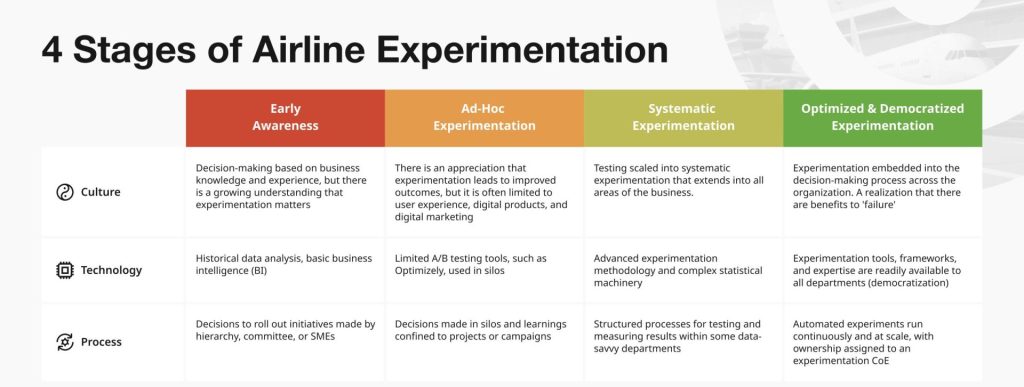
Experimentation is a superpower for airline commerce and revenue management that helps them fine-tune existing approaches or delve into under-charted areas with greater confidence. We take a closer look at how and why it works.
How do you figure out the quickest way to walk home after visiting a friend? Chances are, you’ve tried different routes and picked the best one. This is a simple form of experimentation called A/B testing, and it’s something we use in everyday life to help us make better decisions.
But as we’ll see, it can also be applied to business, where decisions usually have bigger consequences than arriving home a few minutes later. If done well, it’s especially beneficial for businesses like airlines, which operate in a constrained yet volatile environment, where there is little room for risk. Here’s how experimentation works—and why it’s critical for airline commerce.
The Basics of Experimentation
Experimentation, like basic A/B testing, compares two or more options to determine which performs better. The process starts with a hypothesis: an educated guess about which option will give the best results. Then, a test is run on a small sample to see which performs better. As a result, an option is either:
- Scaled into a full rollout
- Further tweaked and optimized
- Reconsidered and potentially rolled back in favour of another action.
A/B testing is widely used in digital marketing, websites, and digital product design. For example, marketing professionals might use A/B testing to see which subject line entices more people to open an email to improve campaign performance.
Testing is such a powerful way to improve performance that companies like travel tech giants Booking.com, Expedia, and Airbnb run thousands of tests every year. For instance, Booking.com experiments around the clock, tweaking everything from button colours and image placement to review presentations to understand what influences a customer’s decision to buy.
Bringing Experimentation into the Business
The great thing is, that we can use the power of experimentation outside of the digital domain and apply it to all elements of the business for better performance across KPIs. But complexity, small sample sizes, noise, and other challenges are often more than A/B simple tests can tackle. Fortunately, there are now more sophisticated techniques that can address these issues.
Experimentation and Airline Commerce
What does this mean for airline commerce? Working in airline commerce and revenue management comes with a lot of pressure. The business, valued partners, and customers all demand innovation; however, it’s difficult to take chances while walking a tightrope of razor-thin margins and volatile demand.
But teams have to take risks to keep up with a changing market and new tech. Widespread adoption of IATA NDC, advances in dynamic pricing, and the introduction of generative AI all promise commercial gain but come with creaking uncertainty.
Revenue management algorithms, simulation, digital twins, predictive and prescriptive analytics—there are many tools at the disposal of a modern airline leader or practitioner. But not all methods are infallible.
Experimentation is the perfect partner to these initiatives. By testing actual against expected outcomes, experimentation not only provides essential guardrails that enable teams to innovate confidently, but can pinpoint a small uplift or downward trend, which can add up to big returns over a relatively short period of time.
Airline Commerce’s New Superpower
For airline commerce and revenue management, experimentation is a superpower that helps them fine-tune existing approaches with an additional layer of clarity for incremental gain; or delve into under-charted areas with greater confidence. Here are three ways that experimentation is powering up innovation in airline commerce today:
Pricing Intervention: Does adjusting prices by X% in response to market changes or competitive shifts increase yield? With experimentation, revenue management teams are precisely assessing whether corrective action has the impact they want, allowing them to fine-tune tactics for improved results.
Dynamic and Continuous Pricing Strategies: Does a new pricing strategy outperform the old one? Experimentation is revealing if models like dynamic pricing lead to meaningful revenue gains. By testing these strategies on specific flights or routes, teams are gaining real-world insights to enhance their understanding of customer price sensitivity and demand elasticity.
Personalization: Do personalized offers drive revenue growth? Experimentation provides a structured approach to assess the effectiveness of personalization strategy. By using this method, airlines are accurately attributing revenue gains to initiatives like personalized pricing, tailored bundles, and targeted promotions, ultimately maximizing revenue across different customer segments.
Culture of Experimentation
By this point, you may have twigged to something exciting: Experimentation can benefit not only airline commerce and revenue management, but the entire airline business. With the right tools, frameworks, skills, and attitude in place, many important business decisions can be tested, validated, optimized, and scaled—or tested, invalidated, and reconsidered.
This concept of pervasive testing is called a “culture of experimentation,” where failure is accepted as a learning opportunity, success is continuously refined through iterative testing, and the effectiveness of every decision is measured.
By conducting fast, scalable, and rigorous experimentation, acmetric enables airline leaders to determine if they are headed in the right direction when it comes to a myriad of moves from price points, products, and promotions to technology choices and innovation.
We speed up time-to-value and increase confidence, which ultimately results in greater returns for your organization. Whether through tactical tests on high-value projects or scaled experimental culture that benefits every aspect of your business, acmetric can help.
Want to learn more? Join our round table or visit our stand at World Aviation Festival 2025.
World Aviation Festival 2024 – Round Table
At World Aviation Festival 2024, acmetric will explore how far along your airline is regarding experimentation maturity.
To see the full model as a PDF, click on the thumbnail below.
We’ll dive into this model in the coming weeks. Follow us on LinkedIn for updates.
